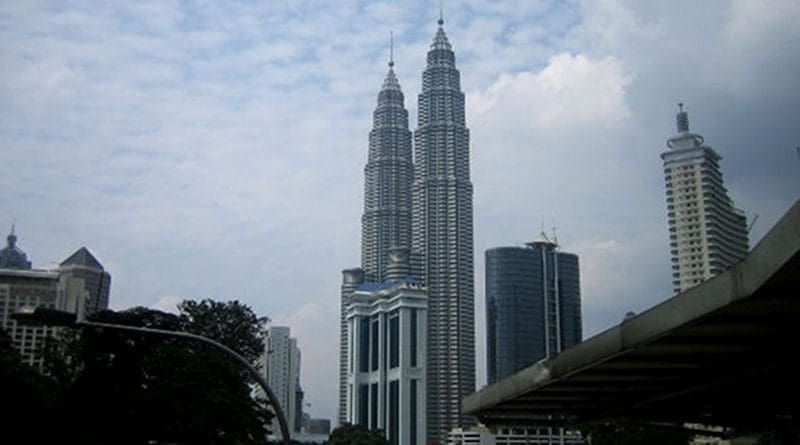Malaysia’s Economic Transformation Still Going Strong – OpEd
While the main focus of economic news coming out of Asia this year has been China’s stuttering growth, the country’s major trade partners in Southeast Asia have faced their own individual challenges in responding to market fluctuations in Beijing. Some economies, such as junta-ruled Thailand, have struggled under the weight of uncertainty in China and insecurity at home. Others, like Malaysia and Vietnam in particular, have taken steps to leverage their own comparative advantages and better coordinate with other Pacific economies to open new avenues for major export industries. With the ASEAN Economic Community (which was put into place this November) and the Trans-Pacific Partnership (TPP) coming into effect, these nations are hoping for brighter prospects in terms of weathering events in China and diversifying trade relationships abroad.
For Malaysia, these two initiatives may ultimately be indispensable in achieving Prime Minister Najib Razak’s Economic Transformation Programme (ETP), aimed at transforming Malaysia into a high-income economy by 2020. The ETP, launched in September 2010 with the goal of increasing Malaysia’s gross national income (GNI) per capita to $15,000 USD by 2020, seeks to attract $444 billion in new investments and create 3.3 million new jobs. Since the height of the global financial crisis, Malaysia’s economy has managed consistent progress in all of these areas. While the country’s average GDP growth since 2000 averages only 1.29 percent, the period since 2010 has seen a much stronger average of 5.3 percent a year. That growth has spurred the creation of 1.8 million jobs, pushing Malaysia’s unemployment rate downwards to its current level of 3.1%. GNI per capita, meanwhile, reached $10,426 USD in 2014 (compared to $7,620 in 2009), close to the $12,476 defined by the World Bank as “high income”. At the same time, business-friendly institutional reforms promulgated under the ETP have made the country more competitive, with the World Economic Forum ranking it the world’s 18th most competitive economy in 2015.
In pursuing high-income status for Malaysia, Najib’s government is banking on both the TPP and the ASEAN Economic Community as key to securing future growth. But Malaysia is not expected to be the most impressive beneficiary of a successfully implemented TPP agreement; that title goes to Vietnam, which stands to gain 11% in additional GDP growth and 28% in export growth (estimated to be worth $36 billion dollars) if and when the TPP brings down 18,000 tariffs among the twelve countries who negotiated it. While the TPP’s intellectual property clauses have sparked furious opposition from various market actors (such as generic pharmaceuticals), those protections would also make participating countries more appealing destinations for international companies looking to invest.
Alongside the TPP, Malaysia’s establishment of the ASEAN Economic Community is designed to integrate the ten ASEAN member states into a single economic area that will bring together over 625 million people and a combined GDP of $2.5 trillion USD. As a unified market and production base, the Community seeks to facilitate the free flow of goods, labor, and capital within the ASEAN member states and make the region as a whole more appealing to international businesses and investors (who would face lower trade barriers upon entry into the unified market). If successful, the ASEAN Economic Community could bring with it a 7 percent increase in aggregate output and 14 million new jobs across the ten countries by 2025. Much like the TPP, however, the blueprint for the new trade area requires a significant amount of legislative reform on the national level for its promised benefits to become a reality.
Malaysia’s domestic economic expansion, meanwhile, has persevered in the face of a political scandal dividing the sitting prime minister, his former mentor Mahathir Mohamad, and his outspoken deputy Muhyiddin Yassin. Mahathir and Muhyiddin, who have called for Najib to step down over corruption allegations stemming from the indebted 1MDB development fund, appear to be attempting to replicate their successful ouster of former premier Abdullah Ahmad Badawi in 2009, while at the same time using the scandal to discredit the economic achievements of Najib. In the wake of the United Malays National Organization (UMNO) party assembly earlier this month, however, Najib appears to have successfully retained the support of the majority of his party and shored up his leadership position in the face of efforts to unseat him.
The market fluctuations in China and the downturn in oil prices and foreign investments this year have put a dent in Malaysia’s economic expansion, but Najib’s government appears to be successfully weathering the 1MDB political storm and continuing with economic reforms. Considering the boon Malaysian exporters stand to see as a result of the TPP and the ASEAN Economic Community, the aspirations of the ETP should remain well within reach over the next few years. If so, Najib’s government will have a strong economic record to point to in UMNO’s next leadership contest and Malaysia’s 2018 elections.
*Alicia Conway is currently undertaking a Master’s in Economics and Management in London

